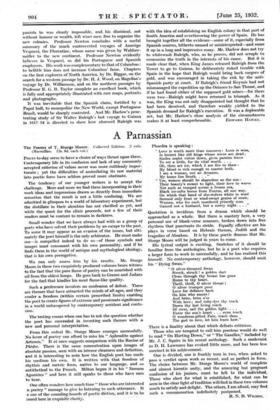A Parnassian
The Poems of T. Sturge Moore. Collected Edition. 2 vols. (Macmillan. 12s. 6d. each vol.) Posers to-day seem to have a choice of ways thrust upon them. Contemporary life in its confusion and lack of any commonly accepted criterion of values never was more.ruthlessly impor- tunate; yet the difficulties of assimilating its raw material into poetic form have seldom proved more obstinate.
The tendency of our younger writers is to accept the challenge. More and more we find them incorporating in their work ideas and impressions drawn so directly from immediate sensation that the result is not a little confusing. We are admitted in glimpses to a world of laboratory experiment, but the distillate in their alembics has not clarified as yet, and while the quest for the elixir proceeds, not a few of their readers must be content to remain in darkness.
Small wonder that we have always had with us a group of poets who have solved their problems by an escape to the past. To some it may appear as an evasion of the issues, but ulti. mately the poet himself is the only arbitrator. He Must make use—is compelled indeed to do so—of those symbols and images most consonant with his own personality, and if he finds them in the world of antique and mythological ideology, that is his own prerogative.
We can only assess him by his results. Mr. Sturge Moore in these two exquisitely produced volumes bears witness to the fact that the pure flame of poetry can be nourished with oil from the oldest lamps. He goes back to Greece and Judaea for the fuel that kindles his most flame-like quality.
Such, a preference involves no confession of defeat. These are themes that have attracted the minds of all ages, and they confer a. freedom (within certain prescribed limits) enabling the poet to create figures of extreme and passionate significance in a World unhampered by contemporary accident and confu- sion:
The-testing comes when one has to ask the question whether the poet has succeeded in investing such themes with a new and personal interpretation.
From this ordeal Mr. Sturge Moore emerges successfully. No lover of poetry can afford to miss his "Aphrodite against Artemis." It at once suggests comparison with the Racine of Phedre. There is the same concentration upon images of absolute passion, seen with an intense clearness and definition, and it is interesting to note how the English poet has made his medium his own. It is written with that freedom of rhythfii and metric form, native to our language, and so antithetical to the French. Milton began it in his "Samson Agonistes " and here it still speaks to those who have -ears
to hear. -
One often wonders how much time" those who are interested n poetry" manage to give to listening to such utterance. It s one of the sounding-boards of poetic diction, and-it is tobe I ound here in exquisite clarity.
Phaedra is speaking : Love is worth more than manners; Love is wise, Is lenient like old kings whose wives are dead Smiles zealot virtue down, gives passion leave To err a little, for its vital worth. . . . Oh, thou art ice, which I am fire to thaw; My blood is rich enough to master both. I am a woman, not an Amazon, My home lies South. . . " " Yes, women should be shameless as. the sun Their beauty's meant to light, their love to warm Not such as trooped across a frozen sea, Black ice-rafts borne from Pontus, all one way, On which that band of she-wolves white in wool Seemed only frost or wind-swept grains of snow. Women, who for each murdered princely man Gained not a husband, but a merry night. . . ."
Quotation is invidious from a drama which should be approached as a whole. But there is mastery here, a very personal use of blank-verse measure, broken down into free rhythms that punctuate its stride. Equally effective are his
plays in verse based on Hebraic themes, Judith and the tragedies of Absalom. It is by these poetic dramas that Mr. Sturge Moore will be judged in years to come.
Ills lyrical output is exciting. Snatches of it should be familiar from the anthologies, but he is a poet who requires a larger form to work in successfully, and he has realized this himself. No contemporary anthology, however, should omit his Dying Swan."
"0 silver-throated Swan Struck, struck ! a golden dart. Clean through thy breast has gone Rome to thy heart.. Thrill, thrill, 0 silver throat !
'0 silver trumpet pour
Love for defiance -back
On him who smote !
And brim, brim o'er With love ; and ruby-dye thy track Down thy last living reach Of river, sail the golden light.. . . Enter the sun's heart . . . even teach 0 wondrous-gifted Pain, teach thou The god to love, let him learn how."
There is a finality about that which defeats criticism.
Those who are tempted to call him precious would do well to read " On Harting Down," or "The Gazelles," included by Mr. J. C. Squire in his recent anthology. Such a modernist as D. H. Lawrence has evoked little more, and has been less succinct in his achievement.
One is divided, one is frankly torn in two, when asked to pass a verdict upon work so recent, and so perfect in form. The choice between Mr. Sturge Moore's world of complete
and almost hieratic unity, and the annoying but pregnant confusion" of his juniors, must be left to the individual, Those who elect for what is established, for what can be seen in the clear light of tradition will find in these two volumes much to satisfy and delight. The others, I am afraid, may find
such a consummation indefinitely postponed.
R. N. D. Wasom.


































 Previous page
Previous page